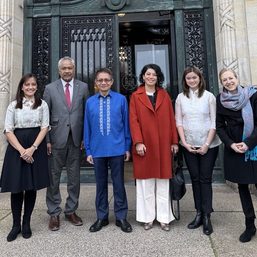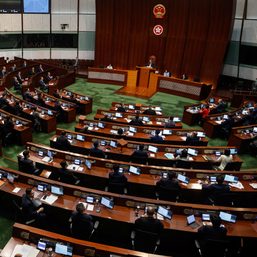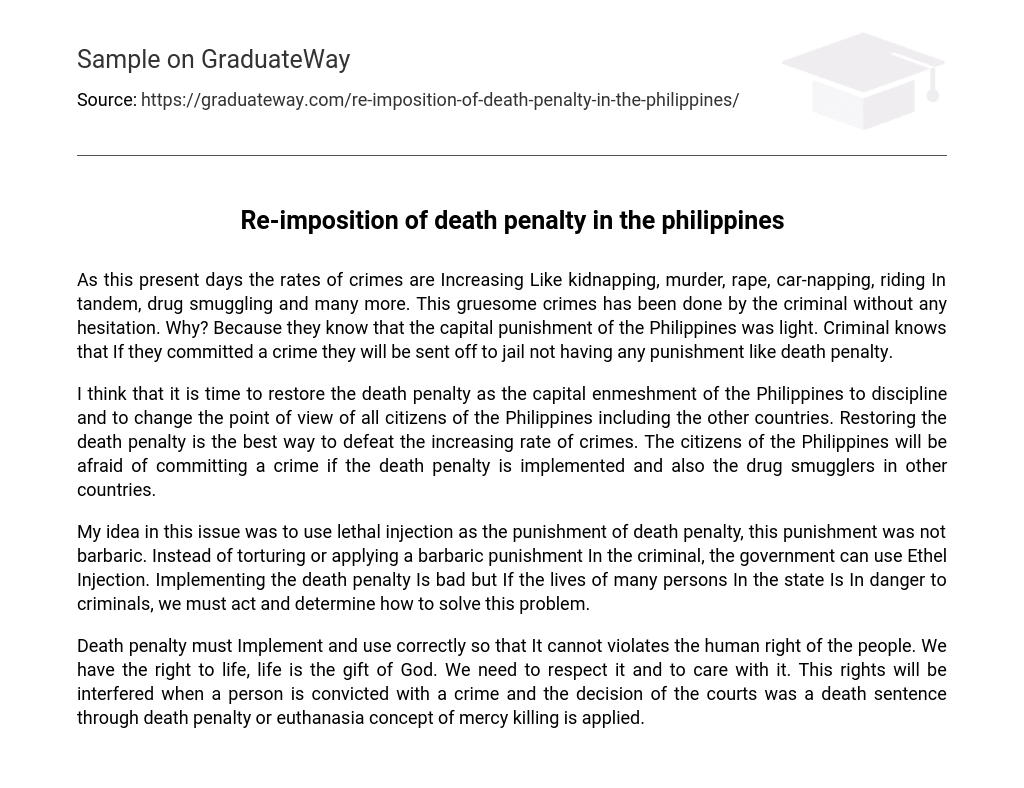Username or Email Address
Remember Me

Exploring the Death Penalty in the Philippines Essay
Is the death penalty truly an effective deterrent to crime? And what are the ramifications of its application in the Philippines ? Join us as we delve into the controversial topic of capital punishment in the Philippines , examining its history, legal implications, and impact on human rights.
The Philippines made history in 1987 when it became the first Asian country in modern times to abolish the death penalty for all crimes. However, in 1993, it was reintroduced for “heinous” crimes due to public fear and frustration at increasing rates of violent crime. Today, there are more than 400 people on Death Row in the Philippines, making it one of the countries with the highest sentencing rates in the world.
Key Takeaways:
- The death penalty was abolished in the Philippines in 1987 but reintroduced in 1993 for “heinous” crimes.
- The country has one of the highest sentencing rates in the world, with over 400 people on Death Row.
- Arguments against the death penalty include doubts about its deterrent effect and concerns about fairness in trials.
- Studies have shown that the death penalty does not act as a greater deterrent to crime compared to other forms of punishment.
- The international community opposes the death penalty, and the Philippines risks violating its human rights obligations if it reinstates it.
The Legal and Human Rights Context
In 1987, the Philippines promulgated a Constitution with a Bill of Rights, solidifying its commitment to upholding human rights. This important document established an independent Commission on Human Rights and affirmed the country’s dedication to international human rights norms by acceding to major human rights treaties.
However, the reintroduction of the death penalty in the Philippines raises significant concerns regarding human rights violations. The right to life and the prohibition of cruel, inhuman, and degrading treatment or punishment are fundamental human rights principles that must be protected.
There have been troubling allegations of torture and ill-treatment used to extract confessions, which not only violates human rights but also poses a grave risk of judicial error. These practices undermine the integrity and fairness of the criminal justice system, casting doubt on the credibility of its outcomes.
Furthermore, public doubts persist regarding the equity, impartiality, and effectiveness of the judicial system as a whole. Disparities in access to justice and the unequal treatment of individuals based on their socio-economic status undermine the principles of equality and fairness under the law.
In upholding human rights in the Philippines , it is crucial to critically assess the impact of the death penalty on both the constitutional framework and the broader human rights landscape of the country.
Arguments Against the Death Penalty
Opponents of the death penalty in the Philippines present compelling arguments that challenge its efficacy and fairness in the criminal justice system. These arguments shed light on the flaws and potential injustices associated with capital punishment.
1. Lack of Deterrence
One of the key arguments against the death penalty is that it does not act as a greater deterrent to crime compared to other forms of punishment. Research has shown that the threat of execution does not significantly reduce crime rates. Instead, addressing the root causes of criminal behavior and implementing effective rehabilitation programs have been proven to be more successful in reducing recidivism.
2. Risk of Wrongful Convictions
Another critical concern with the death penalty is the inherent risk of miscarriages of justice. No criminal justice system is immune from errors, and wrongful convictions can and do occur. Once a person is executed, there is no opportunity for exoneration if new evidence or factual errors come to light. This irrevocability magnifies the importance of ensuring fair trials and avoiding irreversible mistakes.
3. Disproportionate Impact on Disadvantaged Sectors
Advocates against the death penalty argue that it disproportionately affects disadvantaged sectors of society, exacerbating inequality before the law. Studies have shown that individuals from marginalized communities, who often lack access to quality legal representation, are more likely to receive harsher sentences, including the death penalty. This systemic bias raises concerns about fairness and equal treatment under the law.
“The death penalty fails to address the root causes of crime and perpetuates a system that disproportionately impacts vulnerable individuals and communities.” – Human Rights Watch
Promoting alternatives to capital punishment that focus on rehabilitation, reform, and addressing societal inequalities could lead to a more just and equitable criminal justice system.
These arguments challenge the effectiveness, fairness, and justice of the death penalty in the Philippines. Considering these concerns is crucial in promoting a criminal justice system that upholds human rights, equality, and the pursuit of genuine justice.
Impact on Crime Levels
Contrary to popular belief, the death penalty does not have a significant impact on reducing crime levels or enhancing the security of law-abiding citizens. Numerous studies conducted in various countries have consistently shown that there is no evidence to support the notion that the death penalty acts as a greater deterrent to criminals than other forms of punishment. Instead, several underlying factors contribute to the root causes of criminal behavior.
The Real Factors Fueling Criminality
Factors such as poverty, social inequality, unemployment, and the weakening of social control methods play a much larger role in fueling criminality. Socioeconomic disparities and lack of access to basic needs often lead individuals towards criminal activities . Addressing these fundamental issues and implementing effective social and economic policies can have a more significant impact on crime reduction and the overall well-being of society.
“The death penalty doesn’t solve the issues of crime; it merely masks the underlying societal problems that need to be addressed.” – Dr. Maria Santos, Criminologist
Statistics on Death Penalty and Crime Rates
Let’s examine the statistics on death penalty implementation and crime rates in several countries:
As seen in the table above, the data does not support the argument that the death penalty leads to lower crime rates. In fact, countries with abolished death penalty have shown low to moderate crime rates, while countries that retain the death penalty exhibit varying levels of crime rates.
The statistics clearly indicate that the death penalty is not a reliable tool for crime prevention. To ensure a safer society, it is crucial to address the root causes of crime and implement comprehensive social and economic reforms that uplift communities and provide opportunities for all individuals.

Concerns about Fair Trials
The rapid rate of death sentences in the Philippines is taking place within a context of public doubts over the equity, impartiality, and effectiveness of the judicial system. There is a perception that those with influence or wealth can enjoy impunity, while those from disadvantaged sectors of society face disadvantage in the criminal justice system. Safeguards to ensure fair trials, including the right to competent legal counsel, are not consistently upheld.
Historical Use of the Death Penalty
The history of the death penalty in the Philippines is a complex and evolving one. Capital punishment has been a part of the country’s criminal justice system during different periods of its history.
Under Spanish rule, the Spanish Codigo Penal of 1848, which was introduced in the Philippines in 1884, included several capital offenses such as treason, piracy, and murder. During this time, the death penalty was carried out through methods such as firing squad and garrote.
Following the introduction of internal self-government in 1934 and full independence in 1946, there were changes in the application of the death penalty. The newly established Philippine government sought to reform the criminal justice system, and discussions on the abolition of the death penalty emerged.
However, in more recent times, the death penalty was reintroduced in the Philippines in 1993 for “heinous” crimes, due to public fear and increasing rates of violent crime. Today, the country grapples with a high number of individuals on Death Row and ongoing debates on the efficacy and ethics of capital punishment.

International Human Rights Obligations
The Philippines ratified the Second Optional Protocol to the International Covenant on Civil and Political Rights in 2007, which requires countries to abolish the death penalty. Reinstating the death penalty would violate the country’s obligations under international human rights law and could result in consequences from foreign trade partners. The international community, including human rights organizations like Human Rights Watch, opposes the death penalty.
Current Situation and Government Stance
The Duterte administration in the Philippines has publicly supported the reinstatement of the death penalty. This stance aligns with President Rodrigo Duterte’s tough-on-crime approach, particularly in addressing drug offenses. Currently, the House Committee on Justice is deliberating on bills that propose the reintroduction of capital punishment, specifically through lethal injection.
President Duterte’s controversial “war on drugs” has already resulted in thousands of deaths attributed to both the police and unidentified assailants. With the government’s overwhelming majority in Congress, it is likely that the death penalty bills will gain support and further progress in the legislative process.
“We need to bring back the death penalty to instill fear, to deter, to prevent crime,” President Duterte said during his 2020 State of the Nation Address.
The government’s position on the death penalty reflects its determination to tackle crime effectively and send a strong message about the consequences of engaging in illegal activities . However, this stance has drawn criticism and concerns from human rights advocates, who argue that capital punishment can lead to violations of the right to life and may exacerbate issues of judicial fairness and errors.
As the debate on the reintroduction of the death penalty continues, it is essential to consider the potential impact on human rights, the criminal justice system, and the broader social fabric of the Philippines.

Risks and Impact on Human Rights
Reimposing the death penalty in the Philippines would worsen the human rights situation and lead to further violations. It would perpetuate the government’s “war on drugs” and increase bloodshed. The rights-violating abyss that the country would descend into cannot be overstated.
“The death penalty contradicts the right to life and the prohibition of cruel, inhuman, and degrading treatment or punishment. It puts at risk the fundamental principles of justice and fairness,” – International Federation for Human Rights
Reinstating capital punishment would undermine the Philippines’ credibility and leverage to negotiate on behalf of its citizens facing execution abroad. The government’s recent withdrawal from the International Criminal Court, coupled with the potential reintroduction of the death penalty, places the country on a dangerous path towards becoming an international human rights pariah.
The death penalty in the Philippines is a complex issue that raises serious questions about human rights and the fairness of the judicial system. Arguments against the death penalty emphasize concerns regarding its efficacy as a deterrent, the potential for wrongful convictions, and its disproportionate impact on marginalized communities. Furthermore, reintroducing the death penalty would violate the country’s international human rights obligations.
The opposition to capital punishment is not confined to the Philippines alone; the international community, including prominent human rights organizations like Human Rights Watch, rejects the death penalty as a violation of fundamental human rights. Restoring the death penalty would not only damage the Philippines’ standing in the global community but also hinder its ability to advocate for its citizens facing execution abroad.
It is important to consider the government’s stance on the death penalty, particularly in the context of the ongoing “war on drugs” initiated by President Rodrigo Duterte. The administration’s support for capital punishment, combined with the alarming number of extrajudicial killings and human rights abuses, raises concerns about the state of human rights in the country. Reimposing the death penalty would exacerbate these issues and further undermine the Philippines’ credibility as a protector of human rights.
In conclusion, the death penalty in the Philippines should be critically examined in light of its potential ramifications for human rights and the judicial system. The arguments against capital punishment, the opposition from the international community, and the questionable human rights situation within the country all contribute to the conclusion that reinstating the death penalty would be a regressive step that contradicts the principles of justice and human rights.
What is the current status of the death penalty in the Philippines?
What are the main arguments against the death penalty in the philippines, does the death penalty have a significant impact on reducing crime levels, are fair trials guaranteed in the judicial system of the philippines, what is the historical use of the death penalty in the philippines, does the philippines have international human rights obligations regarding the death penalty, what is the government’s stance on the death penalty in the philippines, what are the risks and impact of reinstating the death penalty in the philippines, what is the conclusion regarding the death penalty in the philippines, source links.
- https://www.kibin.com/essay-examples/an-argument-against-the-re-imposition-of-the-death-penalty-in-the-philippines-Yy0RFsgW
- https://www.refworld.org/docid/3ae6a99f4.html
- https://www.hrw.org/news/2020/08/05/death-penalty-danger-philippines
Hello! I'm Wise, a Filipina with a deep love for my country and a passion for sharing its beauty with the world. As a writer, blogger, and videographer, I capture the essence of the Philippines through my eyes, hoping to give foreign visitors a true taste of what makes these islands so special.
From the vibrant streets of Manila to the tranquil beaches of Palawan, my journey is about uncovering the hidden gems and everyday wonders that define the Filipino spirit. My articles and blogs are not just travel guides; they are invitations to explore, to feel, and to fall in love with the Philippines, just as I have.
Through my videos, I strive to bring the sights, sounds, and stories of my homeland to life. Whether it's the local cuisine, the colorful festivals, or the warm smiles of the people, I aim to prepare visitors for an authentic experience.
For those seeking more than just a vacation, the Philippines can be a place of discovery and, perhaps, even love. My goal is to be your guide, not just to the places you'll visit, but to the experiences and connections that await in this beautiful corner of the world. Welcome to the Philippines, through my eyes. Let's explore together!
You may also like

Discover The Smallest Island In The Philippines

Supporting Change: Non Profit Organization in the Philippines

Discover Top Vloggers In The Philippines Today!
Add comment, cancel reply.
Your email address will not be published. Required fields are marked *
Save my name, email, and website in this browser for the next time I comment.

Want Flight, Hotel, and Restaurant Discounts for Your Philippines Trip? Join Below!
Email address:
Buy Me a Coffee

- Subscribe Now
[OPINION | New School] Is there a ‘right time’ for the death penalty?
Already have Rappler+? Sign in to listen to groundbreaking journalism.
This is AI generated summarization, which may have errors. For context, always refer to the full article.
![argumentative essay death penalty in the philippines [OPINION | New School] Is there a ‘right time’ for the death penalty?](https://www.rappler.com/tachyon/2021/01/ns-death-penalty-1280.jpg)
Illustration by Guia Abogado
The topic of the death penalty has been brought up many times in the past, and is now experiencing a revival in the current administration. President Rodrigo Duterte renewed his vows to bring it back in his term , and there are bills being filed and reviewed by lawmakers determined to restore the act. And the idea has been met, as is always the case with controversial subjects, with agreement and dissent.
Many say it is high time to get the axe swinging again, that it’s time to instill fear again into those who trample upon the rights of others. The penalty would be a lesson for them to keep in line, a peacekeeping tool that should be used whenever possible.
For others, especially from the religious sectors and myriad human rights groups, the death penalty should only exist in the confines of history, never to be used again, for it is an affront to the constitutional right to life and a grievous moral evil.
However, there is one opinion that both agrees and disagrees at the same time and makes me shudder: to say that the country is not yet ready for the act. That the death penalty is not for this time, but can be implemented in the future.
Clearly, it’s very unviable in current times. The daily killings, the rape of justice, the unfair standards between those who hold power and those who don’t – have become normal.
But it should be unviable in the future as well.
Picture a utopian Philippines, one that is advanced in all aspects – scientifically, economically, and socially, each person enjoys the best quality of life, like in the meme “ Pilipinas kung hindi itinapon ni Isagani ang lampara .” The justice system would be at its best; giving each their due. In this setting, some believe the death penalty can return again to mete out justice to those who have done true evil.
What if, God forbid, it was indeed implemented in this future? We would be seeing in our news feeds each day the names of those who are on death row, as well as those who have been executed. Their weeping faces, claiming that they were innocent, as well as of their families.
I see no difference between the penalty being implemented now or in the future. Children will experience psychological trauma when they hear that their parents are going to die, for an act that they may even still not understand. They may grow in hatred of the law, and even take up the burdens of their fathers or mothers, as well as the incessant stigma on families with convicts. These hardened children would commit more crimes, since they know that death will always be waiting for them anyway. Nothing will have changed.
WebHits: Gravity ending take two

Aside from the convict, we must think about, for lack of a better term, the executioner. Can one comprehend the emotional and psychological effects of the penalty on this person? That the deed has been done, that he or she took a life? And what if that life was innocent? What if the convict was wrongly accused?
Above all, the penalty severely desensitizes us to the idea of death. If some of us don’t bat an eye when someone gets murdered by criminals, then what more when there are regular state-sponsored killings? It is also quite unnerving to imagine that while a convict is being led to the execution room, there are cheers of “Serves you right,” “That’s what you get,” or “You should have thought of this before you did it!”
No person must die by another’s hand. No person must be happy for another’s death.
We remember the Gomburza priests, wrongly accused of sedition; Eduardo Agbayani, who was willing to be forgiven by the daughter he raped, and was a phone call away from survival during former President Joseph Estrada’s term; Paco Larrañaga, who almost died for a crime he was several miles away from; and most recently, Mary Jane Veloso, nearly executed in Indonesia for accusations of drug trafficking, mercifully given the privilege to testify against her recruiters.
People may call us guilty, asking, if we are innocent, then why do we dissent? But we fight for our fellowmen, who all deserve life. We dissent for their loved ones, who would be left in sorrow. We dissent for the sanctity of life itself, which is severely under attack in these difficult times.
Why do we see death as the answer, when it is literally the last resort? Why should we instill fear in people when we can look for other reasons to reduce motives for crime? Why should we kill when there are other methods that are far better and more humane? There are many questions that should be answered, which the simple execution of this harsh law cannot. – Rappler.com
Adrian L. Parungao, 19 years old, is currently a 2nd year Journalism student from the University of Santo Tomas.

Add a comment
Please abide by Rappler's commenting guidelines .
There are no comments yet. Add your comment to start the conversation.
How does this make you feel?
Related Topics
Recommended stories, {{ item.sitename }}, {{ item.title }}, human rights, the whistleblower.

Philippines joins biggest case vs climate change, tells court ‘polluters must pay’

European Union, UN criticize new Hong Kong security law

South Korea-hosted summit warns of AI risks to democracy

[Rappler Investigates] Son of a gun!
![argumentative essay death penalty in the philippines [Rappler Investigates] Son of a gun!](https://www.rappler.com/tachyon/2024/03/newsletter-duterte-quiboloy.jpg?resize=257%2C257&crop=450px%2C0px%2C1080px%2C1080px)
Checking your Rappler+ subscription...
Upgrade to Rappler+ for exclusive content and unlimited access.
Why is it important to subscribe? Learn more
You are subscribed to Rappler+
- Top Stories
- Pinoy Abroad
- #ANONGBALITA
- Economy & Trade
- Banking & Finance
- Agri & Mining
- IT & Telecom
- Fightsports
- Sports Plus
- One Championship
- TV & Movies
- Celebrity Profiles
- Music & Concerts
- Digital Media
- Culture & Media
- Health and Home
- Accessories
- Motoring Plus
- Commuter’s Corner
- Residential
- Construction
- Environment and Sustainability
- Agriculture
- Performances
- Malls & Bazaars
- Hobbies & Collections
- Travel Features
- Travel Reels
- Travel Logs

Early this month, the House Committee on Justice approved a draft law reinstating the death penalty for heinous crimes like drug offenses, treason, qualified piracy, qualified bribery, parricide, murder, infanticide, rape, serious illegal detention, robbery with violence against or intimidation of persons, arson, and plunder.
A vocal critic of the death penalty is the Commission on Human Rights, which insists that the Philippines is bound under an international protocol to perpetually abolish the death penalty in order to finally uphold the right to life. That protocol cited by the CHR is the Second Optional Protocol to the International Covenant on Civil and Political Rights, which purportedly binds signatory countries to do away with the death penalty. The protocol was signed in 2006 under the administration of President Gloria Macapagal-Arroyo.
According to the CHR, the restoration of the death penalty will violate constitutional provisions regarding respect for human rights and the dignity of every person. The CHR also claims that capital punishment by whatever method constitutes cruel, inhuman and degrading punishment, does not accord dignity to human beings, and has no place in a civilized society. In addition, the CHR says that there are no studies which prove that the death penalty deters crime.
For the CHR, effective law enforcement and an efficient criminal justice system are the best deterrents against crime. This proposal is echoed by local Catholic Church leaders.
The arguments raised by the CHR sound good, but they are devoid of legal substance. In fact, there is absolutely nothing in the Constitution which sustains the CHR’s position. A look at the pertinent provision of the Constitution will set the pace.
Section 19, Article III of the Charter states: “Excessive fines shall not be imposed, nor cruel, degrading or inhuman punishment inflicted. Neither shall the death penalty be imposed, unless, for compelling reasons involving heinous crimes, the Congress hereafter provides for it. Any death penalty already imposed shall be reduced to reclusion perpetua.
It will be readily gleaned from the text of Section 19 that although the imposition of cruel, degrading, or inhuman punishment is explicitly prohibited, the same section allows Congress to impose the death penalty for heinous crimes. This clearly means that it was never the intention of the Constitution to consider the death penalty as a cruel, degrading, or inhuman punishment.
Every freshman law student knows that when a particular act is explicitly allowed by the Constitution, it is impossible for that act to be considered unconstitutional. Therefore, since the Constitution allows Congress to impose the death penalty for heinous crimes, the death penalty cannot be unconstitutional. It also means that the death penalty cannot be repugnant to any provision in the Constitution.
Thus, as far as the Constitution is concerned, the death penalty is not a cruel, degrading, or inhuman form of punishment, and the death penalty is not repugnant to any provision of the Constitution.
This effectively debunks the arguments of the CHR to the effect that the death penalty is an unconstitutional form of punishment, and that it violates provisions of the Constitution regarding human rights and dignity.
As for the argument that the death penalty has no place in a civilized society, suffice it to say that that’s a matter of opinion. The military establishment imposes the death penalty on erring soldiers. Does that make the military establishment uncivilized? Death sentences were carried out during the administrations of past presidents under the 1935 Constitution. Does that make those administrations uncivilized? On many occasions in the past, the Supreme Court upheld the death penalty imposed by lower courts on certain convicts. Does that make the justices of the high court uncivilized? Good grief!
Sure, the Philippines signed that protocol on the abolition of the death penalty, and the Constitution itself states that the Philippines adopts the generally accepted principles of international law as part of the law of the land. That notwithstanding, it is a basic principle in constitutional law that an international protocol cannot prevail over a specific provision of the Constitution—like Section 19, Article III which allows the imposition of the death penalty. Moreover, adopting international law as part of Philippine law does not necessarily mean that international law automatically takes precedence over the Constitution.
The reason for the supremacy of the Constitution over an international protocol is obvious—the Constitution was ratified by the sovereign Filipino people; an international protocol signed by the Philippine government does have the same approval from the electorate.
While there may be no empirical data to show that the death penalty is an effective deterrent against crime, there is none to suggest that its abolition has reduced crime.
The proposition that effective law enforcement and an efficient criminal justice system are the best deterrents against crime is, at best, wishful thinking. Effective law enforcement only means that criminals will be caught and charged. On the other hand, an efficient criminal justice system only means crime will not go unpunished. Both do not necessarily assure that nobody will commit crime.
Truth to tell, overpopulation contributes to criminality. A runaway increase in population translates to more unemployed people and, ultimately, to poverty. Desperation results, and desperation triggers crime because it is very difficult to be law-abiding when one is hungry and no meals are forthcoming.
Because the Philippines has a very serious population problem, the government is promoting a population control program. Unfortunately, the Roman Catholic Church is not helping out because it is against contraceptives.
The Church may not know it but by opposing population control, it tacitly condones criminality.
So much for the opposition to the death penalty.
- Commission on Human Rights
- death penalty
- House of Representatives
- human rights advocates
- Victor Avecilla
LATEST NEWS
Bagong silang is now divided into six brgys, thousands of philippine schools suspend in-person classes due to heat—deped, mmda announces 50th edition of metro manila film festival, marcos orders swift implementation of amnesty programs for rebels, mmda gives dpwh greenlight to improve edsa kamuning flyover, cebu pacific resumes tacloban flights, popular articles, ‘philhealth will cover whooping cough fees’, roxas traffic, korean firm invests p3.9b to start bataan factory, quake preparations, dole: workers on april 9 and 10 will get 200% of daily salary, protect workers from heat wave, tucp urges biz, drop in fertility rate will boost working-age population, says cpd.
- Economy & Trade
- Banking & Finance
- Agri & Mining
- IT & Telecom
On the Road
- Monitoring Plus
- Commuter's Corner
- Malls & Bazaars
- Hobbies & Collections
- Entertainment
- TV & Movies
- Music & Concerts
- Culture & Media
Home & Design
- Environment & Sustainability
- Users Agreement
© All Rights Reserved, Newspaper Theme.
- Special Pages
Sample details
- Punishment,
- Death Penalty,
Philippines
- Views: 1,187
Related Topics
- Life imprisonment
- Mandatory sentencing
- Capital Punishment
- North Korea
- South Korea
- Afghanistan
- Death Penalty Pros And Cons
- Is The Death Penalty Effe...
- Mass Incarceration
- Corporal punishment

Re-imposition of death penalty in the philippines Argumentative Essay
The increasing rates of crimes in the Philippines, including kidnapping, murder, rape, car-napping, riding in tandem, and drug smuggling, have led many to call for the restoration of the death penalty as the country’s capital punishment. Criminals commit these heinous crimes without hesitation because they know that the punishment in the Philippines is light. Restoring the death penalty is seen as the best way to discipline and change the point of view of all citizens of the Philippines, as well as to deter drug smugglers in other countries. Lethal injection is suggested as the most humane form of punishment. Although implementing the death penalty is bad, it may be necessary to protect the lives of many persons in the state who are in danger from criminals. However, it is important to use the death penalty correctly so that it does not violate human rights. The right to life is a gift of God that must be respected and protected, even when a person is convicted of a crime.
As this present days the rates of crimes are Increasing Like kidnapping, murder, rape, car-napping, riding In tandem, drug smuggling and many more. This gruesome crimes has been done by the criminal without any hesitation. Why? Because they know that the capital punishment of the Philippines was light. Criminal knows that If they committed a crime they will be sent off to jail not having any punishment like death penalty.
I think that it is time to restore the death penalty as the capital enmeshment of the Philippines to discipline and to change the point of view of all citizens of the Philippines including the other countries. Restoring the death penalty is the best way to defeat the increasing rate of crimes. The citizens of the Philippines will be afraid of committing a crime if the death penalty is implemented and also the drug smugglers in other countries.
My idea in this issue was to use lethal injection as the punishment of death penalty, this punishment was not barbaric. Instead of torturing or applying a barbaric punishment In the criminal, the government can use Ethel Injection. Implementing the death penalty Is bad but If the lives of many persons In the state Is In danger to criminals, we must act and determine how to solve this problem.
Death penalty must Implement and use correctly so that It cannot violates the human right of the people. We have the right to life, life is the gift of God. We need to respect it and to care with it. This rights will be interfered when a person is convicted with a crime and the decision of the courts was a death sentence through death penalty or euthanasia concept of mercy killing is applied.
Cite this page
https://graduateway.com/re-imposition-of-death-penalty-in-the-philippines/
You can get a custom paper by one of our expert writers
Check more samples on your topics
Yes to death penalty in the philippines argumentative essay.
Death Penalty
Cases occur every second, whether in the country or worldwide, causing people to question justice and bringing problems and suffering, particularly for victims. The death penalty is carried out using an electric chair, where proven suspects or criminals are executed by electricity within seconds. Being predominantly Catholic, the Philippines strictly upholds moral standards. As a teenager,
Thesis statement pro death penalty Argumentative Essay
There Is nothing more final than death. As such before we decide such a major Issue as the Death Penalty we better be sure of what we are doing! Superficially it may seem very simple – you kill therefore you should die – but is it really that simple? Let’s take a closer look…. In
Argument: Is the Death Penalty Effective? Argumentative Essay
The death penalty gives closure to the victims of families who have endured the tragedy that many of us fear the most. When someone Is executed who killed a family member, vengeance is a part of the emotions that everyone feels. Families of murder victims would get a sense of closure knowing the person who
Death penalty thesis statement Argumentative Essay
Throughout history, societies have punished criminals by executing them, but today many countries have abolished the death penalty. In the united States however, the federal government and many of the states continue to sentence convicted criminals to death. This leads us to the question: Should the government have the power to sentence convicted criminals to
Is the death penalty effective argumentative
I'm for the death penalty because I believe intentionally taking another human beings life then, yours should be taken also. If the death penalty was not enforced the criminal would still be living with the satisfaction of killing someone. Although, they are locked up in prison for the rest of their life, they're still being
Should the Death Death Penalty Be Legal? Sample
In 2011 43 people received capital penalty and in 2010 46 people were besides killed because of capital penalty. Now in the twelvemonth 2012 there are 3. 146 decease row inmates waiting to be executed. A Gallic philosopher. Albert Camus one time said “Capital penalty is the most premeditated of murders” . Do you believe
The Death of the Death Penalty
Is The Death Penalty Effective
“Many that live deserve death. And some that die deserve life. Can you give it to them? Then do not be too eager to deal out death in judgement.” (Tolkien, 1954) Majority of America have their own strong beliefs as to whether capital punishment should remain in todays society. Those who oppose the death penalty
Death to the Death Penalty
The death penalty has been around as far back as the Bible times. Perhaps even later. It hasn’t been until the last century or so that its ethicality has been questioned. As of now, every single country in Europe except Belarus has abolished the death penalty and this is actually a prerequisite to enter the
Teenage Pregnancy in the Philippines Argumentative Essay
In the year 2013, the total count of the population in the Philippines adds up to 105. 72 million, which makes the country the twelfth most populated nation in the world, such a huge number for a relatively small country. In addition to that, over the past ten years, the number of Filipinos who got

Hi, my name is Amy 👋
In case you can't find a relevant example, our professional writers are ready to help you write a unique paper. Just talk to our smart assistant Amy and she'll connect you with the best match.
- Share full article
Advertisement
Supported by
Guest Essay
The Nobel Winner Who Liked to Collaborate With His Adversaries

By Cass R. Sunstein
Mr. Sunstein is a law professor at Harvard and an author of “Noise,” with Daniel Kahneman and Olivier Sibony.
Our all-American belief that money really does buy happiness is roughly correct for about 85 percent of us. We know this thanks to the latest and perhaps final work of Daniel Kahneman, the Nobel Prize winner who insisted on the value of working with those with whom we disagree.
Professor Kahneman, who died last week at the age of 90, is best known for his pathbreaking explorations of human judgment and decision making and of how people deviate from perfect rationality. He should also be remembered for a living and working philosophy that has never been more relevant: his enthusiasm for collaborating with his intellectual adversaries. This enthusiasm was deeply personal. He experienced real joy working with others to discover the truth, even if he learned that he was wrong (something that often delighted him).
Back to that finding, published last year , that for a strong majority of us, more is better when it comes to money. In 2010, Professor Kahneman and the Princeton economist Angus Deaton (also a Nobel Prize winner) published a highly influential essay that found that, on average, higher-income groups show higher levels of happiness — but only to a point. Beyond a threshold at or below $90,000, Professor Kahneman and Professor Deaton found, there is no further progress in average happiness as income increases.
Eleven years later, Matthew Killingsworth, a senior fellow at the Wharton School of the University of Pennsylvania, found exactly the opposite : People with higher income reported higher levels of average happiness. Period. The more money people have, the happier they are likely to be.
What gives? You could imagine some furious exchange in which Professor Kahneman and Professor Deaton made sharp objections to Dr. Killingsworth’s paper, to which Dr. Killingsworth answered equally sharply, leaving readers confused and exhausted.
Professor Kahneman saw such a dynamic as “angry science,” which he described as a “nasty world of critiques, replies and rejoinders” and “as a contest, where the aim is to embarrass.” As Professor Kahneman put it, those who live in that nasty world offer “a summary caricature of the target position, refute the weakest argument in that caricature and declare the total destruction of the adversary’s position.” In his account, angry science is “a demeaning experience.” That dynamic might sound familiar, particularly in our politics.
Instead, Professor Kahneman favored an alternative that he termed “adversarial collaboration.” When people who disagree work together to test a hypothesis, they are involved in a common endeavor. They are trying not to win but to figure out what’s true. They might even become friends.
In that spirit, Professor Kahneman, well into his 80s, asked Dr. Killingsworth to collaborate, with the help of a friendly arbiter, Prof. Barbara Mellers, an influential and widely admired psychologist. Their task was to look closely at Dr. Killingsworth’s data to see whether he had analyzed it properly and to understand what, if anything, had been missed by Professor Kahneman and Professor Deaton.
Their central conclusion was simple. Dr. Killingsworth missed a threshold effect in his data that affected only one group: the least happy 15 percent. For these largely unhappy people, average happiness does grow with rising income, up to a level of around $100,000, but it stops growing after that. For a majority of us, by contrast, average happiness keeps growing with increases in income.
Both sides were partly right and partly wrong. Their adversarial collaboration showed that the real story is more interesting and more complicated than anyone saw individually.
Professor Kahneman engaged in a number of adversarial collaborations, with varying degrees of success. His first (and funniest) try was with his wife, the distinguished psychologist Anne Treisman. Their disagreement never did get resolved. (Dr. Treisman died in 2018.) Both of them were able to explain away the results of their experiments — a tribute to what he called “the stubborn persistence of challenged beliefs.” Still, adversarial collaborations sometimes produce both agreement and truth, and he said that “a common feature of all my experiences has been that the adversaries ended up on friendlier terms than they started.”
Professor Kahneman meant both to encourage better science and to strengthen the better angels of our nature. In academic life, adversarial collaborations hold great value . We could easily imagine a situation in which adversaries routinely collaborated to see if they could resolve disputes about the health effects of air pollutants, the consequences of increases in the minimum wage, the harms of climate change or the deterrent effects of the death penalty.
And the idea can be understood more broadly. In fact, the U.S. Constitution should be seen as an effort to create the conditions for adversarial collaboration. Before the founding, it was often thought that republics could work only if people were relatively homogeneous — if they were broadly in agreement with one another. Objecting to the proposed Constitution, the pseudonymous antifederalist Brutus emphasized this point: “In a republic, the manners, sentiments and interests of the people should be similar. If this be not the case, there will be a constant clashing of opinions, and the representatives of one part will be continually striving against those of the other.”
Those who favored the Constitution thought that Brutus had it exactly backward. In their view, the constant clashing of opinions was something not to fear but to welcome, at least if people collaborate — if they act as if they are engaged in a common endeavor. Sounding a lot like Professor Kahneman, Alexander Hamilton put it this way : “The differences of opinion, and the jarrings of parties” in the legislative department of the government “often promote deliberation and circumspection and serve to check excesses in the majority.”
Angry science is paralleled by angry democracy, a “nasty world of critiques, replies and rejoinders,” whose “aim is to embarrass,” Professor Kahneman said. That’s especially true, of course, in the midst of political campaigns, when the whole point is to win.
Still, the idea of adversarial collaboration has never been more important. Within organizations of all kinds — including corporations, nonprofits, think tanks and government agencies — sustained efforts should be made to lower the volume by isolating the points of disagreement and specifying tests to establish what’s right. Asking how a disagreement might actually be resolved tends to turn enemies, focused on winning and losing, into teammates, focused on truth.
As usual, Professor Kahneman was right. We could use a lot more of that.
Cass R. Sunstein is a law professor at Harvard and an author of “Noise,” with Daniel Kahneman and Olivier Sibony.
The Times is committed to publishing a diversity of letters to the editor. We’d like to hear what you think about this or any of our articles. Here are some tips . And here’s our email: [email protected] .
Follow the New York Times Opinion section on Facebook , Instagram , TikTok , WhatsApp , X and Threads .

IMAGES
VIDEO
COMMENTS
Argumentative Essay About Death Penalty in the ... This persuasive essay will examine both sides of the argument and attempt to come to a conclusion on the death penalty in the Philippines. To begin, let us look at why proponents argue for the death penalty as an effective deterrent. Supporters contend that it sends a powerful message to ...
However, the literature suggests that there is still no clear and credible empirical evidence to back the argument that the death penalty is a crime deterrent. Furthermore, this paper examined the potential drivers of the growing death penalty support in the Philippines and the possible implications of reinstating the death penalty in the ...
Today, the House of Representatives of the Philippines adopted on its third and final reading of House Bill 4727, a measure put forward by President Duterte's majority coalition to reintroduce the death penalty. The idea that the death penalty will rid the country of drugs is simply wrong. The resumption of executions will not rid the ...
The death penalty was abolished in the Philippines in 1987 but reintroduced in 1993 for "heinous" crimes. The country has one of the highest sentencing rates in the world, with over 400 people on Death Row. Arguments against the death penalty include doubts about its deterrent effect and concerns about fairness in trials.
Republic Act 9346 was then signed on June 24, 2006, abolishing the death penalty in the Philippines. Life imprisonment and reclusion perpetua took its place. Leo Echegaray was the last person to ...
In 2007, the Philippines ratified the Second Optional Protocol to the International Covenant on Civil and Political Rights, which requires countries to abolish the death penalty.
In 1987 the Philippines set an historic precedent by becoming the first Asian country in modern times to abolish the death penalty for all crimes. However, the death penalty was reintroduced in the Philippines in late 1993 for 46 different offences. Executions resumed in 1999 until former President Estrada in 2000 announced a moratorium on ...
How We Kill: Notes on the Death Penalty in the Philippines . Joel F. Ariate Jr. . . A week after assuming office, neophyte senators Christopher "Bong" Go and Ronald . "Bato" dela Rosa ...
No person must be happy for another's death.'. The topic of the death penalty has been brought up many times in the past, and is now experiencing a revival in the current administration. President ...
December 20, 2016, 12:01 am. - Advertisement -. Opponents of the death penalty are at it again. So-called human rights advocates and highly politicized leaders of the Roman Catholic Church in the Philippines are pressuring the House of Representatives to abandon its plan to restore the death penalty in the country.
This persuasive essay will examine both sides of the argument and attempt to come to a conclusion on the death penalty in the Philippines. To begin, let us look at why proponents argue for the death penalty as an effective deterrent. Supporters contend that it sends a powerful message to potential criminals and deters them from committing ...
This essay was written by a student. You can get a custom paper by one of our expert writers. The Philippines is one of the many countries that have the death penalty. The death penalty is the legal process of execution of a person as a punishment for a crime. It is a very controversial and sensitive topic, especially in the Philippines.
DEATH PENALTY IN THE PHILIPPINES An Argumentative Essay Should the death penalty be abolished or should it continue? Many people think differently, some people want the death penalty for certain reasons and the other people don't want it. Another term for this is capital punishment. Capital punishment is a process by which convicted criminals are executed by the governing authority.
Texas Death Penalty Controversy Introduction Texas has a long history of using the death penalty as a form of punishment for serious criminal offenses. The state has carried out the most executions of any state in the United States since the reinstatement of the death penalty in 1976, with a total of 570 executions as of September 2021.
Death Penalty In The Philippines Essay. 2088 Words9 Pages. Death penalty is a capital punishment;it is used today and was also used during ancient times to penalize people with a variety of offenses. Due to the alarming upsurge of heinous crimes which has resulted not only in the loss of human lives and wanton destruction of property but also ...
Death Penalty in the Philippines. Categories: Death penalty Philippines. Download. Essay, Pages 17 (4206 words) Views. 6049. 1987 . But six yearsafter it has reimposed the death penalty, the Philippines has overtaken its Asian neighbors and hasthe most number of death convicts.Within less than a year, however, the military establishment was ...
Death penalty must Implement and use correctly so that It cannot violates the human right of the people. We have the right to life, life is the gift of God. We need to respect it and to care with it. This rights will be interfered when a person is convicted with a crime and the decision of the courts was a death sentence through death penalty ...
Should the death penalty be revived? Since time immemorial, the death penalty has been an extremely controversial issue for Filipinos and has again come into focus as a major political issue because of its detrimental as well as its beneficial effects to the countrymen. Because crime rates...
Evidence: If death penalty were implemented in the country, the majority of instances would result in innocent individuals being wrongly convicted. The Philippines' legal system might be swayed by power, money, persuasion, and fraud. It doesn't matter if the accused is genuinely guilty of the crime or innocent since the ultimate outcome will only be based on the choice of the powerful and ...
In 2010, Professor Kahneman and the Princeton economist Angus Deaton (also a Nobel Prize winner) published a highly influential essay that found that, on average, higher-income groups show higher ...
The primary purpose of this death penalty was to combat crime during the period of widespread lawlessness within the Philippines that preceded the imposition of Martial Law in 1972. Following Republic Act (RA) 7659, which was approved by Congress, President Ramos' government restored the death penalty in December 1993 according to the ...
Monday: 23 states do not have the death penalty. Tuesday: Wisconsin was the first to fully abolish the death penalty, in 1853. Wednesday: The murder rate is higher in states that have the death ...